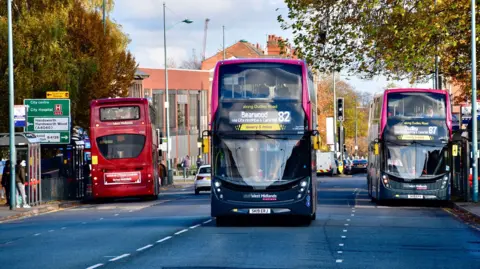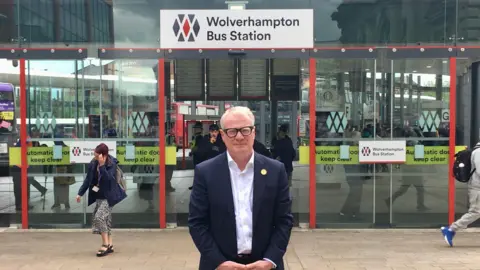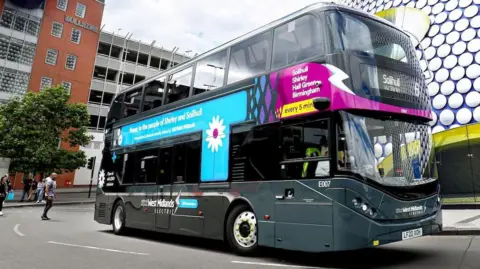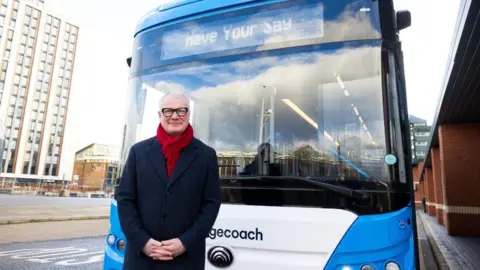Bus franchising: What does it mean for passengers?
 BBC
BBCPeople are being asked to give their views on plans for a bus franchising scheme in parts of the West Midlands.
Buses in the region are currently run by private companies but this could change following a public consultation on plans to bring buses back under public control.
Under franchising, Transport for West Midlands (TfWM), will instead set bus fares, timetables and routes and award contracts to private bus operators to run them.
West Midlands Mayor Richard Parker called for people to share their views to help shape the plans, before a decision on the franchising scheme is made.
"Buses are the backbone of our transport system, used by thousands of people every week to get to work, school, hospital, to see friends or visit our high streets," Parker said.
"They provide an affordable alternative to the car, helping to reduce traffic congestion and pollution while supporting our businesses."
 LDRS
LDRSThe West Midlands mayor represents 2.8 million people across Birmingham, Coventry, Dudley, Sandwell, Solihull, Walsall and Wolverhampton.
The West Midlands Combined Authority (WMCA), which runs TfWM, said it believed it needed to change the way local buses were run to achieve its ambitions for better buses.
In December, it agreed to go out to consultation, after an independent audit concluded that franchising would deliver better value for money and improve services.
What is bus franchising?
Currently, buses in the area are operated by private companies, which decide timetables, routes and fares.
As of April 2024, there were 14 operators providing bus services in the West Midlands, including National Express West Midlands and Stagecoach Midlands.
The changes would mean the bus companies still owned the vehicles, but routes, timetables and bus fares, as well as both vehicle and service standards, would instead be decided by the WMCA.
In the last year, there were more than 240 million bus journeys across the region, accounting for about 80% of all public transport journeys, TfWM said.
What does bus franchising mean for passengers?
Bringing the bus network into public control could result in better services for passengers.
It would provide improved service quality and vehicles and better integration for passengers across public transport, including rail and tram, the WMCA said.
Reforming bus services would give the combined authority the power to deliver integrated fares and a "simpler ticketing system" for passengers, which could include setting a local fare cap.
It could also provide opportunities to make "transformational changes" to the bus network and ensure it expands over the coming years.
If approved, the transition will cost the authority about £22m, with franchised bus services beginning from 2027.
Parker said despite public funding, the current bus system was "letting people down" and was "often unreliable".
"That is why I pledged to make the region's buses work for its people and this consultation is a big step towards delivering on that," he added.
 National Express Coventry
National Express CoventryWhat other areas have franchised buses?
Buses were recently brought back under public control for the first time in 40 years in Greater Manchester, following a franchising process led by Mayor Andy Burnham.
Liverpool also reversed the deregulation of bus services, introduced in 1986, after councillors voted in favour of the plans in 2023.
The power to franchise out bus services has been in the hands of metropolitan mayors since the Bus Services Act in 2017.
In March last year, the West Yorkshire Combined Authority announced franchising would also be implemented in the region, with the first franchised buses expected to launch in Leeds in March 2027.
Currently, a consultation on how bus services should be run is ongoing in South Yorkshire until 15 January.
What have private bus operators said?
National Express West Midlands, which operates a majority of buses in the area, told the BBC it took "great pride" in running the local bus network.
It added it was focused on working with local leaders to strengthen the bus network and to deliver an efficient public transport service.
"Whether we deliver that through partnership or move to a franchising system, National Express West Midlands shares the goal of delivering a high quality service for our customers and stakeholders," a spokesperson said.
Stagecoach Midlands said the West Midlands had one of the "best bus networks in the country" and operators worked in partnership with the WMCA to provide reliable and efficient services for passengers.
"We recognise and respect the right of local authorities to consider other ways of delivering bus services and deciding what is the best method for them," a spokesperson told the BBC.
"We will be responding to the consultation to give our thoughts about how franchising of bus services could deliver benefits for bus users and best support communities."
How long is the consultation?
People can have their say on plans to franchise the bus network until 30 March.
Once responses are reviewed and a consultation report has been prepared, a final decision is expected to be made in the spring.
 WMCA
WMCAFollow BBC Birmingham on BBC Sounds, Facebook, X and Instagram.
